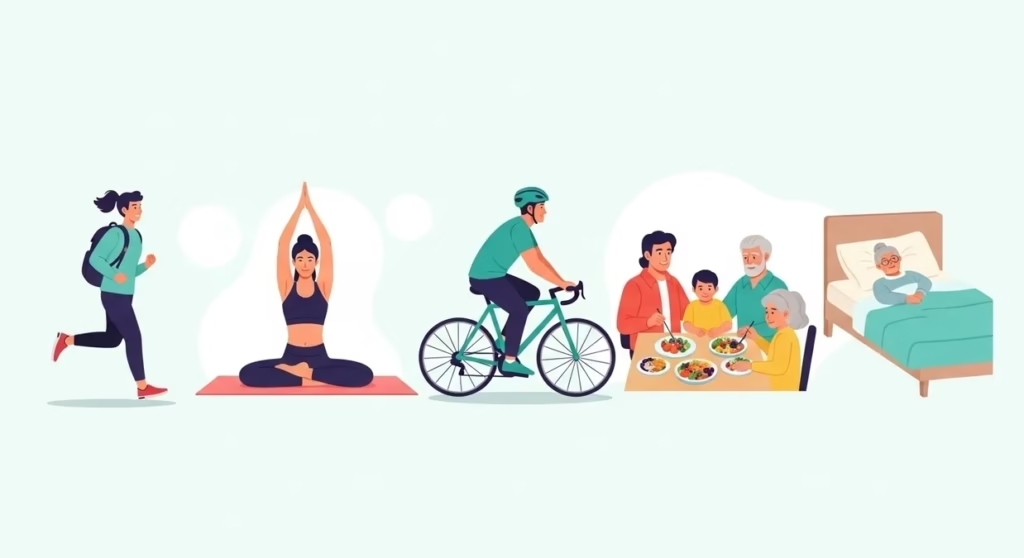Introduction: Why Physical Health Matters
“Health is wealth” — we all know this phrase, but in today’s fast-paced lifestyle, many people tend to ignore their physical well-being. Whether you are a student, a working professional, or an older adult, your physical health directly influences your productivity, happiness, and long-term quality of life.
Physical health is not just about hitting the gym or avoiding illness. It is about creating a balanced lifestyle that includes nutrition, exercise, sleep, preventive care, and stress management.
What is Physical Health?
Physical health refers to the overall well-being of your body and the optimal functioning of your internal systems — heart, lungs, muscles, bones, and nervous system. It is not merely about being free from diseases, but about having the energy, strength, and resilience to perform daily activities effectively.
Core elements of physical health include:
- Balanced nutrition – providing fuel to the body
- Regular exercise – building stamina and strength
- Adequate sleep – repairing and restoring body systems
- Preventive care – avoiding illness and chronic conditions
- Stress management – balancing both physical and mental wellness
Why is Physical Health Important?
Maintaining good physical health is essential for both short-term well-being and long-term quality of life.
Short-Term Benefits
- Boosts daily energy and stamina
- Improves mood and concentration
- Reduces stress and anxiety
- Enhances sleep quality
Long-Term Benefits
- Lowers the risk of chronic diseases like heart disease, diabetes, and obesity
- Strengthens bones and muscles
- Supports healthy aging
- Strengthens the immune system
- Increases life expectancy
👉 According to the CDC, regular physical activity significantly reduces the risk of premature death and chronic health problems.
Key Components of Physical Health
1. Balanced Nutrition
Food is fuel for the body. A well-balanced diet ensures your body gets the nutrients it needs for energy, repair, and disease prevention.
- Eat plenty of fruits and vegetables
- Include whole grains (oats, brown rice, quinoa)
- Choose lean proteins (fish, eggs, beans, lentils)
- Limit sugary drinks, processed food, and junk food
- Stay hydrated (8–10 glasses of water daily)
👉 Harvard T.H. Chan School of Public Health highlights that a healthy diet can reduce the risk of chronic diseases by up to 40%. (Source)
2. Regular Exercise
The World Health Organization (WHO) recommends that adults should engage in at least 150 minutes of moderate-intensity physical activity per week.
Types of Exercises:
- Cardio: walking, cycling, swimming
- Strength training: weight lifting, resistance bands
- Flexibility: yoga, stretching
- Daily movement: taking the stairs, walking meetings
If you publish fitness-related blogs, you can link to an article like How to Start Your Fitness Journey for more workout tips.
3. Adequate Sleep
Sleep is as important as diet and exercise. During sleep, your body repairs cells, regulates hormones, and strengthens immunity.
- Adults need 7–9 hours of sleep daily
- Maintain a consistent bedtime routine
- Avoid caffeine and screens before bed
- Create a cool, dark, quiet sleeping environment
4. Stress Management
Chronic stress can harm both your mental and physical health. It can increase the risk of high blood pressure, heart problems, and digestive issues.
Tips for Managing Stress:
- Practice meditation and deep breathing
- Keep a journal
- Spend time on hobbies
- Maintain healthy social relationships
5. Preventive Healthcare
Preventive care ensures that health problems are detected and managed early.
- Schedule annual medical checkups
- Stay updated on vaccinations
- Monitor blood pressure, cholesterol, and sugar levels
- Don’t skip dental checkups
Practical Steps to Improve Physical Health
Daily Habits
- Start the day with 20 minutes of walking or stretching
- Eat a protein-rich breakfast
- Drink 2–3 liters of water
- Take short breaks for stretching during work
- Sleep at least 7 hours
Weekly Habits
- Exercise 3–4 times a week
- Meal prep healthy foods
- Spend a few hours outdoors (cycling, hiking, walking in nature)
- Reduce screen time and practice digital detox
For more trusted information, visit the CDC – Physical Activity Guidelines.
Physical Health vs. Mental Health
Although different, physical and mental health are deeply connected.
- Physical health: Refers to the body’s ability to function efficiently
- Mental health: Refers to emotional, psychological, and social well-being
👉 Example: Regular exercise (physical health) reduces stress and boosts serotonin levels (mental health). Likewise, good mental health encourages better lifestyle choices that benefit the body.
Barriers to Physical Health
Many people struggle to maintain good physical health because of:
- Busy lifestyle (lack of time)
- Sedentary work culture
- Easy access to unhealthy food
- Stress and poor sleep habits
- Lack of motivation
Solution: Focus on small, consistent lifestyle changes. For example, replace soda with water, take stairs instead of elevators, and add 10 minutes of stretching to your routine.
Technology and Physical Health
Modern technology can be a great ally in improving physical health.
- Fitness apps help track steps, workouts, and calories
- Wearables like smartwatches monitor sleep and heart rate
- Telemedicine enables remote consultations
- Online workout programs make exercise more accessible
FAQs on Physical Health
Q1: What is the simplest way to improve physical health?
👉 Start with daily brisk walking and avoid processed foods.
Q2: Can I stay healthy without exercise?
👉 A healthy diet helps, but long-term physical health requires regular physical activity.
Q3: Is 6 hours of sleep enough for adults?
👉 No, adults should get 7–9 hours of quality sleep for optimal health.
Q4: How can I track improvements in my physical health?
👉 Look for higher energy levels, improved stamina, better sleep, and positive results in medical checkups.
Conclusion
Good physical health is not about perfection; it’s about balance. By focusing on nutrition, regular exercise, adequate sleep, and preventive care, you can build a foundation for long-lasting wellness.
Start small today — take a short walk, choose a healthier meal, or go to bed on time. Over time, these small actions create a healthier, stronger, and happier you.







